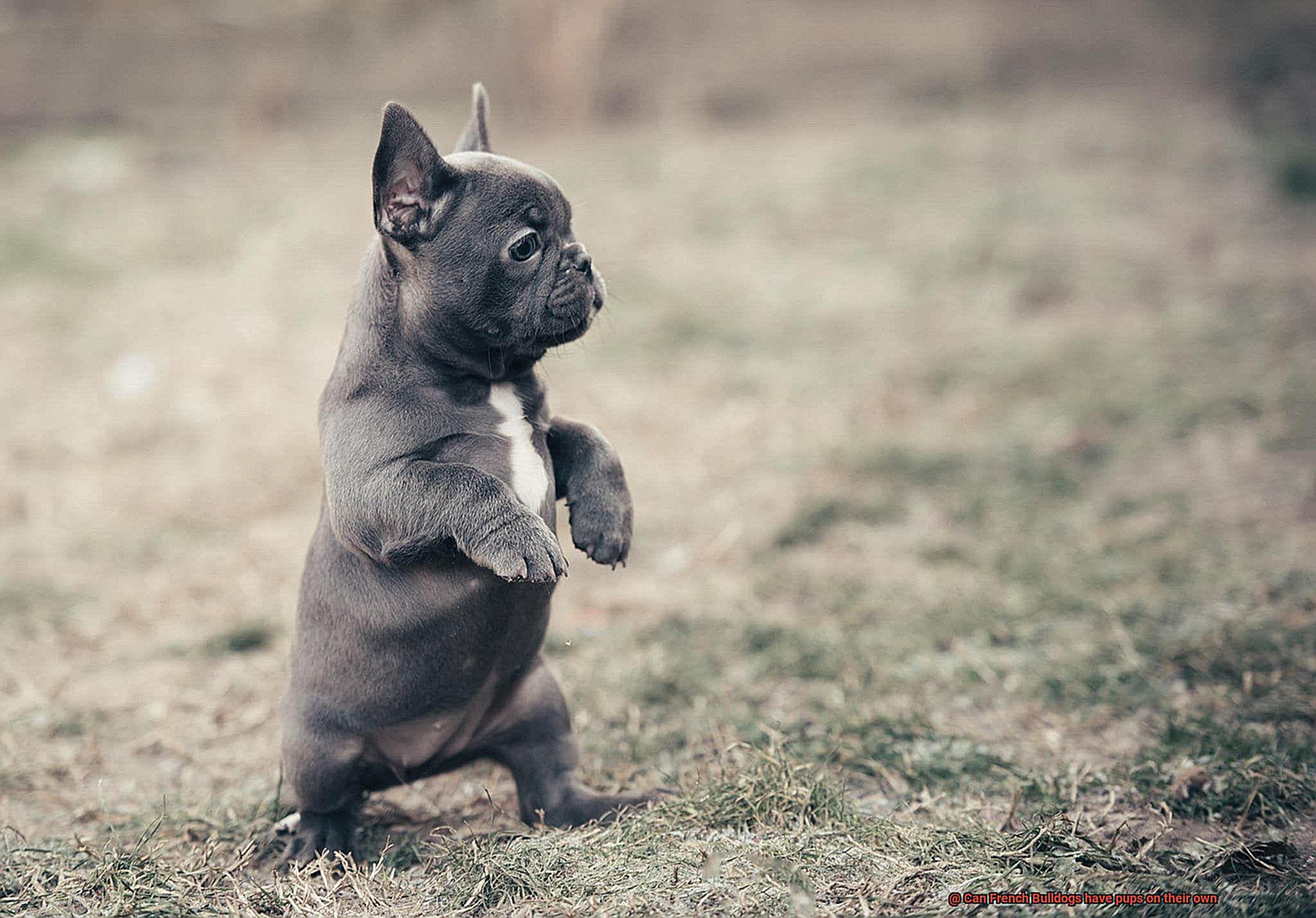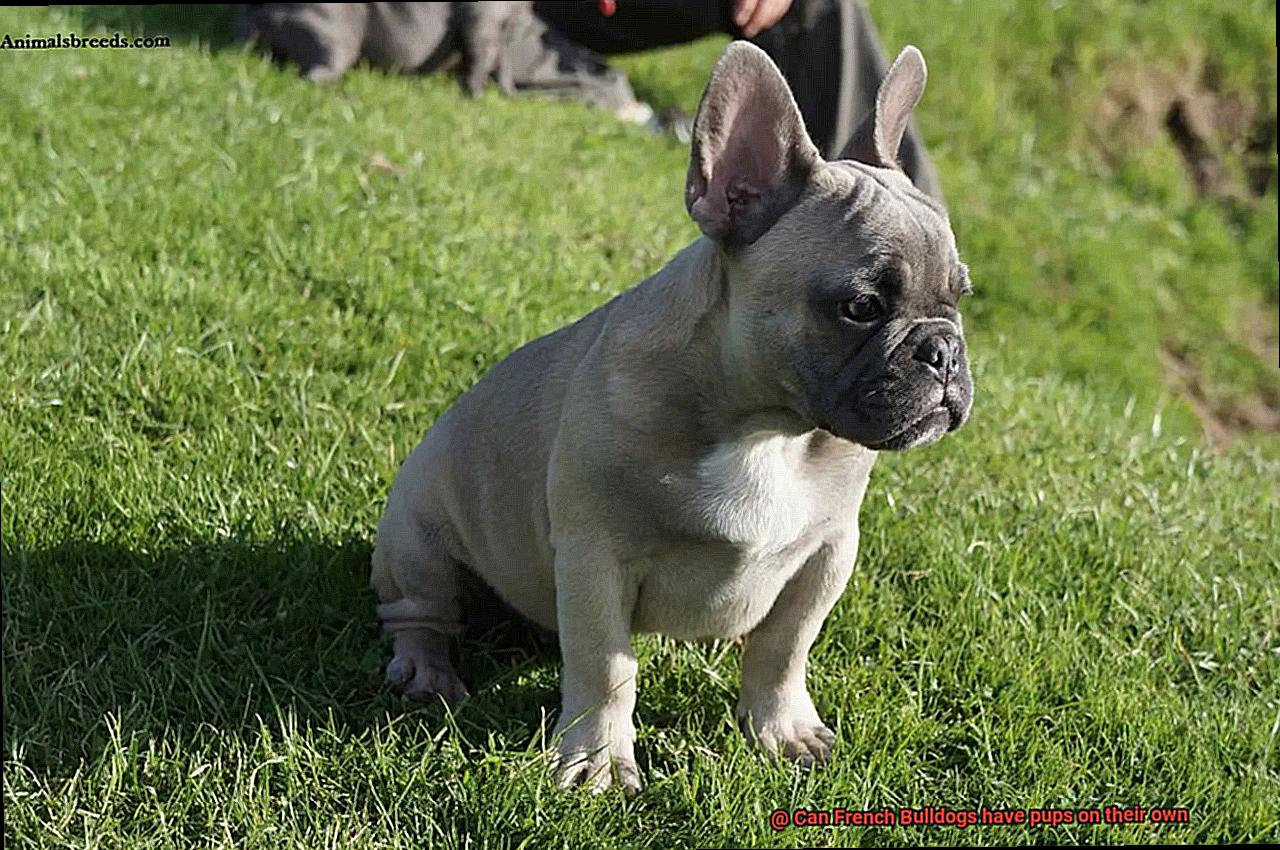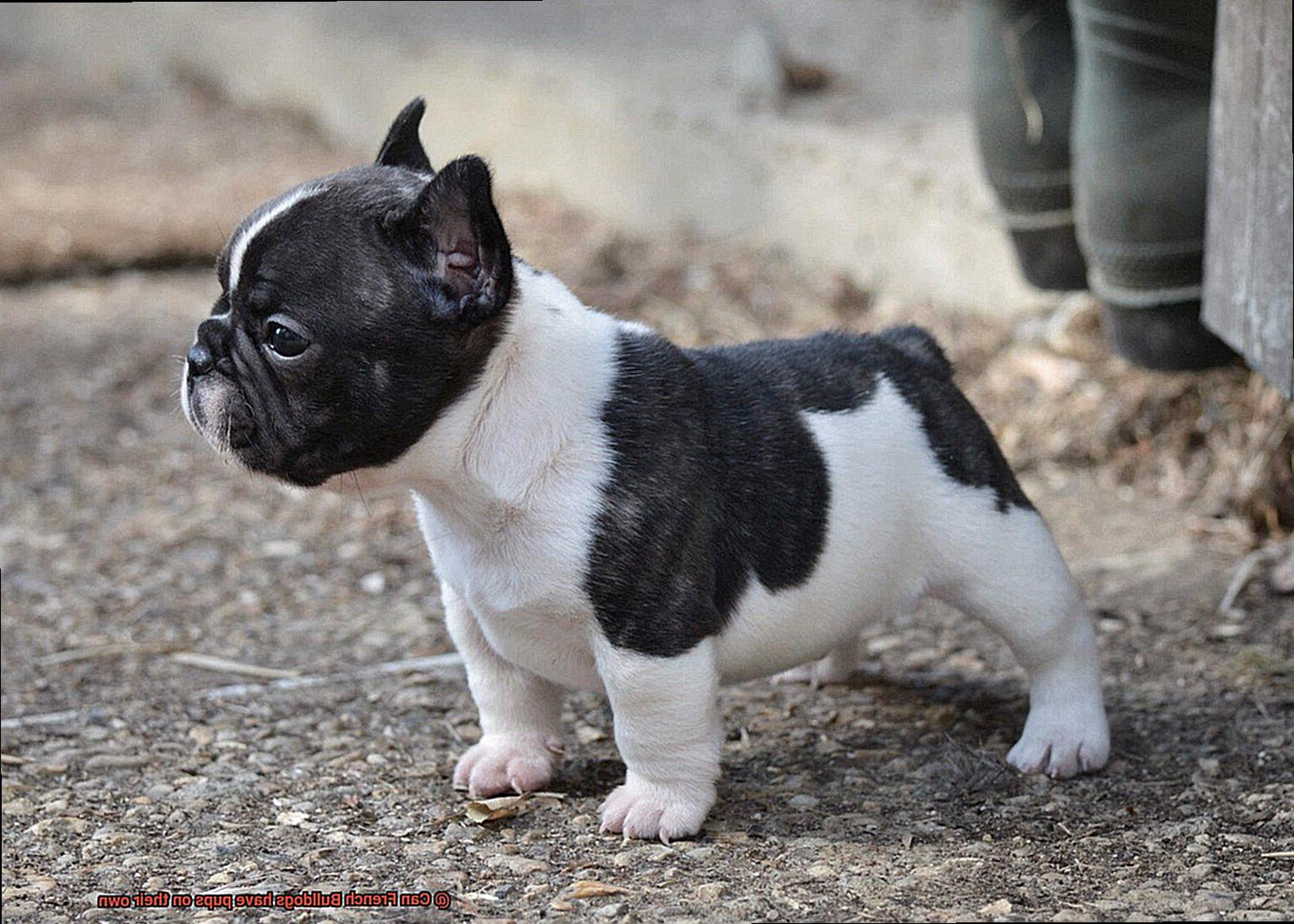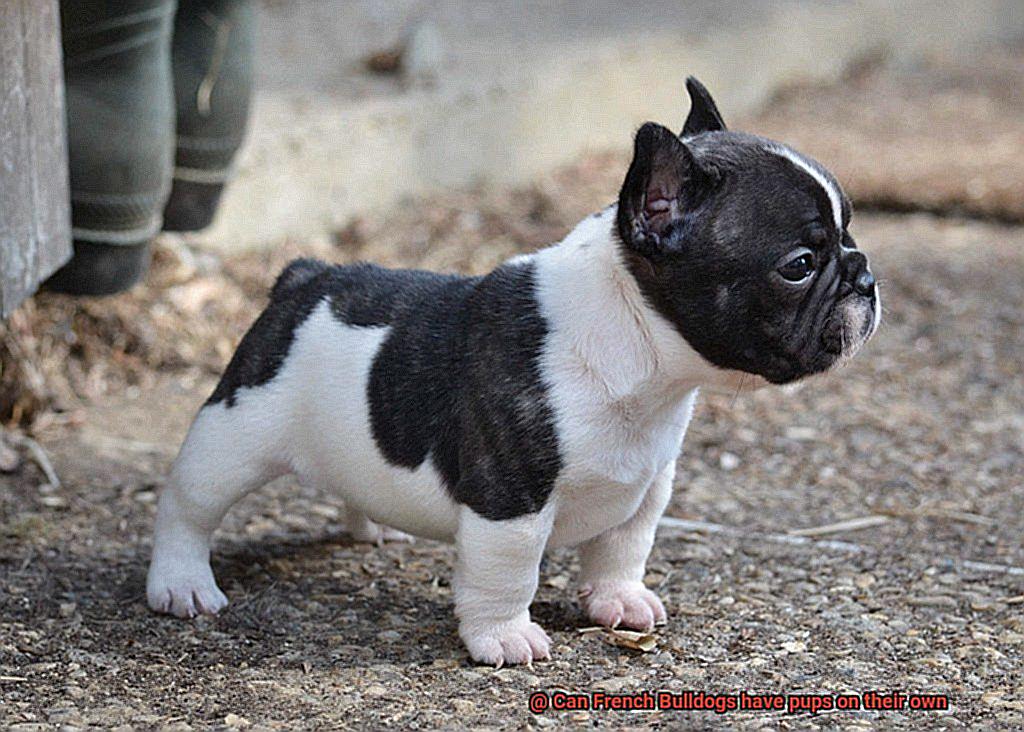Can French Bulldogs have pups on their own?
Today, we’re diving headfirst into one of the most captivating mysteries surrounding our beloved four-legged pals. Brace yourselves as we embark on an exploration into the reproductive capabilities of those irresistibly cute and charming French Bulldogs.
As proud parents or potential future guardians of these delightful little companions, it’s only natural to be curious about their ability to bring forth new life. You’ve probably pondered, “Can French Bulldogs have pups on their own?” Well, wonder no more. In this blog post packed with knowledge bombs, we’ll unveil the truth behind this intriguing question.
French Bulldogs, with their distinct physical features and irresistible personalities, have skyrocketed in popularity over the years. They’ve stolen our hearts and become darlings for countless families across the globe. Yet when it comes to their reproductive prowess, misunderstandings and confusion abound.
So join us as we embark on a whirlwind journey through the wild world of French Bulldog reproduction. We’ll shed light on their innate instincts, potential fertility hiccups, and even delve into the controversial realm of assisted breeding. Whether you’re a curious canine enthusiast, an aspiring breeder, or a concerned Frenchie owner seeking answers – fear not. This post aims to arm you with invaluable insights into this captivating subject.

Prepare yourself for an adventure into the fascinating realm of French Bulldog reproduction. Together, let’s uncover the truth that lies beneath.
The Unique Physical Characteristics of French Bulldogs
Contents
- 1 The Unique Physical Characteristics of French Bulldogs
- 2 The Challenges of Natural Breeding and Birthing in French Bulldogs
- 3 Artificial Insemination as a Breeding Solution for French Bulldogs
- 4 Proper Care During Pregnancy for French Bulldogs
- 5 Why C-Sections Are Often Necessary for French Bulldog Litters
- 6 What Owners Should Know Before Breeding a French Bulldog
- 7 Ensuring the Health and Safety of Both Mother and Puppies
- 8 Conclusion
French Bulldogs are adored for their unique physical characteristics that set them apart from other dog breeds. From their compact size to their distinct head shape and short muzzle, these charming pups have a look all their own. In this blog post, we’ll dive into the fascinating world of French Bulldog physical traits, shedding light on what makes them so special.
Compact Size and Muscular Build:
French Bulldogs may be small, but they are mighty. With a sturdy bone structure and a well-developed musculature, these little dogs pack a punch. Their compact size allows them to fit perfectly into your lap while still exuding a strong and muscular presence.
Distinctive Head Shape:
One cannot help but notice the French Bulldog’s distinctive head shape. Their large, square-shaped heads with flat faces, known as brachycephalic skulls, are an iconic feature of the breed. Combined with their expressive round eyes set wide apart and bat-like ears standing erect, French Bulldogs exude an alert and attentive look that can melt anyone’s heart.
Short and Smooth Coat:
French Bulldogs boast a short and smooth coat that comes in various colors such as brindle, fawn, white, or a combination of these shades. Their coat is low-maintenance, making grooming a breeze. Additionally, their loose and wrinkled skin adds to their unique appearance, especially around the neck and shoulders.
Corkscrew Tail:
French Bulldogs sport a naturally short tail often referred to as a “screw” tail. This unique feature is thick at the base and tapers towards the end, resembling a corkscrew. While their tails may not wag vigorously like some other breeds, they carry them low with a subtle charm all their own.
Short Muzzle:
The short muzzle of French Bulldogs contributes to their brachycephalic nature, giving them that adorable squished-face look. However, it’s important to note that this feature can lead to respiratory challenges and difficulties in regulating their body temperature efficiently.
Understanding the unique physical characteristics of French Bulldogs not only enhances our appreciation for their irresistible charm but also enables us to provide them with the care they need.
From their compact size and muscular build to their distinctive head shape and short muzzle, every aspect of a French Bulldog’s appearance contributes to their one-of-a-kind allure.
The Challenges of Natural Breeding and Birthing in French Bulldogs
French Bulldogs are undeniably adorable, but their unique characteristics present certain challenges when it comes to natural breeding and birthing. In this article, we’ll explore the specific hurdles faced by French Bulldogs and how breeders and owners can navigate these obstacles to ensure the health and well-being of these beloved pets.
The Mating Maze:
French Bulldogs’ brachycephalic nature poses a hurdle in the realm of natural breeding. Their short stature and narrow hips make it difficult for them to engage in traditional mating positions.
The use of artificial insemination has become a common solution for French Bulldogs, allowing breeders to bypass these difficulties and increase the chances of successful reproduction.
Ovulation Obstacles:
Female French Bulldogs often experience challenges with ovulation, which can complicate the breeding process. Hormone treatments may be necessary to stimulate egg release, ensuring a higher likelihood of conception. Consulting with a veterinarian experienced in reproductive issues is crucial to navigating this aspect of breeding.
Birthing Battles:
The birthing process in French Bulldogs can be riddled with obstacles due to their narrow pelvis and large heads. These anatomical features make it difficult for puppies to pass through the birth canal without assistance. Consequently, cesarean sections are commonly performed to ensure the safe delivery of puppies. While some argue that this intervention is necessary, others express concerns about its impact on genetic diversity within the breed.
Respiratory Risks:
Breeding French Bulldogs naturally poses respiratory risks for both males and females. The exertion required during mating can strain their already compromised respiratory systems, potentially leading to respiratory distress or collapse. It’s essential to monitor their breathing during the process and seek veterinary attention if any concerning symptoms arise.
Postpartum Perils:
Complications such as uterine infections and postpartum hemorrhage can arise after birthing in French Bulldogs. These conditions can be life-threatening and require immediate veterinary intervention. Monitoring the mother dog closely and seeking prompt medical assistance is crucial during this vulnerable period.
Artificial Insemination as a Breeding Solution for French Bulldogs
Let’s talk about one of the most effective breeding solutions for our beloved French Bulldogs – artificial insemination. Now, I know what you’re thinking, “Wait, isn’t that something only humans do?” Well, my friend, you’re in for a surprise. Artificial insemination is a common and highly successful method used by breeders to ensure the continuation of this adorable breed.
So, why do we need artificial insemination for French Bulldogs? Let me break it down for you. These little cuties have a narrow pelvis and large heads, which can make natural birth a bit of a challenge. We certainly don’t want any harm coming to the mother or her precious puppies, do we? Of course not. That’s where artificial insemination swoops in to save the day.
The process involves collecting sperm from a male dog and then introducing it into the female’s reproductive tract using specialized instruments. There are two main types of artificial insemination: vaginal and transcervical. In the vaginal method, the sperm is deposited directly into the female’s vagina with the help of a syringe or pipette. The transcervical method, on the other hand, involves passing a catheter through the cervix and depositing the sperm directly into the uterus. Fancy stuff, right?
Now, you might be wondering about the advantages of artificial insemination for French Bulldogs. Buckle up because I’ve got quite a list for you. First off, artificial insemination has higher success rates compared to natural breeding.
It reduces the risk of injury during mating, which is especially important considering their unique anatomy. Plus, breeders can have better control over the entire breeding process, ensuring that only the healthiest and most desirable traits are passed on.
But wait, there’s more. With artificial insemination, breeders can also use frozen or chilled semen. Imagine having access to genetic material from dogs that may not be physically present or available for natural breeding. It’s like having a treasure trove of genes at your fingertips. This opens up a whole world of possibilities for maintaining and improving the breed.
Before you get too excited, though, I want to emphasize that artificial insemination is not a walk in the park. It requires expertise and specialized equipment. That’s why it’s crucial for breeders to work closely with a veterinarian who has experience in canine reproduction.
You don’t want to leave this in the hands of someone who’s just winging it.
Proper Care During Pregnancy for French Bulldogs
Bringing new life into the world is an exciting and special time, especially when it comes to our furry friends. French Bulldogs, with their adorable looks and lovable personalities, require proper care during pregnancy to ensure the health and well-being of both the mother and the puppies. As an expert in canine care, I’m here to guide you through the essential steps to provide the best care for your pregnant French Bulldog.
Balanced and Nutritious Diet:

During pregnancy, it’s crucial to provide a high-quality and balanced diet for your French Bulldog. Opt for dog food specifically formulated for pregnant or nursing dogs. Look for options that are rich in essential nutrients like protein, calcium, and vitamins. These nutrients support the growth and development of the puppies.

Regular Veterinary Check-ups:
Just like humans, regular prenatal check-ups are vital for pregnant French Bulldogs. Consult with a veterinarian who can monitor the progress of the pregnancy and address any potential complications. They can also guide you on appropriate weight gain and suggest any necessary supplements.
Moderate Exercise:
Exercise is still important during pregnancy, but it’s essential to moderate it to avoid excessive strain on the mother. Short walks and gentle playtime can help maintain muscle tone and prevent weight gain. However, avoid high-intensity activities or strenuous exercises that may put unnecessary stress on the mother.
Create a Comfortable Environment:
As the pregnancy progresses, it’s important to create a comfortable and safe environment for your French Bulldog. Set up a designated area with soft bedding away from noise and excessive activity. This provides a calm and secure space for the mother to rest during this crucial time.
Hydration is Key:
Adequate hydration is essential during pregnancy, so make sure fresh water is readily available at all times. Monitor water intake closely to ensure your pregnant French Bulldog is drinking enough to stay hydrated.
Be Attentive to Signs of Distress:
Pay close attention to any signs of distress or complications during pregnancy. Excessive panting, loss of appetite, lethargy, or abnormal discharge should be addressed promptly by consulting with a veterinarian. Early intervention can help prevent potential problems.
Prepare for the Arrival of Puppies:
Before the big day arrives, prepare a whelping box with clean bedding. Ensure it’s warm and draft-free to provide a comfortable space for the mother and puppies. Familiarize yourself with the signs of labor and have necessary supplies on hand to ensure a smooth delivery process.
Provide Emotional Support:
Pregnancy can be an emotional time for your French Bulldog, so be sure to provide extra attention and affection. Gentle handling and emotional support can help alleviate any stress or anxiety she may experience during this important journey.
Why C-Sections Are Often Necessary for French Bulldog Litters
French Bulldogs are adorable and beloved companions, but their unique body structure presents some challenges when it comes to giving birth. In this article, we will explore why C-sections are often necessary for French Bulldog litters and why it’s important for owners to be aware of these factors.
The Narrow Pelvis: A Delicate Passage
French Bulldogs have a compact and muscular build, which results in a narrower pelvis compared to other dog breeds. This narrow pelvic structure makes natural birth difficult and risky for both the mother and the puppies. Imagine trying to squeeze a watermelon through a keyhole – it’s just not feasible or safe.
Big Heads, Tiny Passageways
Adding to the challenge is the size and shape of French Bulldog puppies’ heads. These adorable little bundles of joy often have larger heads in proportion to their bodies, making it even more challenging for them to pass through the mother’s birth canal naturally. It’s like trying to fit a square peg into a round hole.
Large Litters: A Magnitude of Risks
French Bulldogs are known for having large litters, which further complicates the birthing process. The more puppies there are, the higher the risk of complications during natural birth. Dystocia (difficulty giving birth) and prolonged labor can occur, putting both the mother and the puppies at risk.
Respiratory Challenges: Breathing Difficulties
Another factor that increases the likelihood of C-sections in French Bulldogs is their predisposition to brachycephalic syndrome. This condition is characterized by an obstructed airway, narrow nostrils, and an elongated soft palate. During labor, these respiratory problems can make it difficult for the mother to breathe properly, posing a greater risk if she were to attempt natural birth.
Prioritizing Safety: A Safer Alternative
The well-being of both the mother and the puppies is of utmost importance, and C-sections provide a safer alternative to ensure a successful delivery. This surgical procedure allows veterinarians to have better control over the birthing process, minimizing risks and complications.
Planning Ahead for a Safe and Smooth Delivery
It’s crucial for French Bulldog owners to be aware of these factors and understand that C-sections are often necessary for their breed. By planning ahead and consulting with a veterinarian experienced in French Bulldog deliveries, you can ensure a smooth and safe birthing experience for your furry friend.
While C-sections may come with a higher cost and require careful post-operative care, they have become a common practice for French Bulldogs, ultimately improving the chances of healthy puppies and reducing the risks associated with natural birth.
What Owners Should Know Before Breeding a French Bulldog
Here’s What You Need to Know.
So, you’re thinking about breeding your French Bulldog? Well, buckle up because there’s a lot you need to know before you dive headfirst into this adventure. Breeding a French Bulldog isn’t all rainbows and unicorns – it requires careful consideration, planning, and a whole lot of responsibility. Let’s break it down for you:
Health Matters:

French Bulldogs are notorious for their health issues, like breathing difficulties, hip dysplasia, and allergies. Breeding a dog with these problems can pass them down to the puppies, leading to a lifetime of medical concerns. So, before you start playing matchmaker for your Frenchie, consult with a vet and conduct thorough health screenings to ensure you’re not passing on any unwanted baggage.
Age is Just a Number:
Timing is everything when it comes to breeding your Frenchie girl. Breeding her too early can spell trouble during pregnancy and birth, while waiting too long can increase the risk of complications for both mama and puppies. It’s generally recommended to wait until your Frenchie has reached at least two years of age before considering breeding.
It’s Not All Fun and Games:
Breeding a French Bulldog isn’t as simple as throwing two dogs together and waiting for the magic to happen. It requires careful planning, supervision, and knowledge about canine reproductive health. Be prepared for potential complications during pregnancy and birth, and make sure you have the resources and know-how to provide proper care for the mother and puppies.
Money Can’t Buy Happiness (or Expertise):
Breeding should never be solely for financial gain or as a hobby without proper knowledge and experience. Responsible breeding requires dedication, time, and resources. Educate yourself about genetics, breeding standards, and proper care for both mama and puppies. Build a support network of experienced breeders and veterinarians who can provide guidance and assistance throughout the process.
Ethical Breeding is the Way to Go:
French Bulldogs are incredibly popular, which unfortunately means there are many irresponsible breeders out there. Breeding should be done with the intention of improving the breed and producing healthy, well-tempered puppies, rather than contributing to overpopulation or the exploitation of these dogs. Make sure you’re doing it for all the right reasons.
Ensuring the Health and Safety of Both Mother and Puppies
Breeding French Bulldogs is an exciting yet challenging process that requires careful planning, attention to detail, and a strong focus on the health and safety of both the mother and the puppies. In this blog post, we will discuss the essential steps to ensure a successful birthing process for your French Bulldog.
Providing a Clean and Comfortable Environment:
- Set up a clean whelping area with soft bedding to provide comfort for the mother and puppies.
- Ensure proper ventilation to maintain fresh air circulation.
- Keep the temperature controlled within a suitable range to prevent overheating or chilling.
Monitoring the Mother Closely:
- Observe the mother’s behavior during labor and delivery.
- Look out for signs of distress, complications, or difficulty in giving birth.
- Seek veterinary assistance if necessary to ensure a safe delivery.
Proper Nutrition and Hydration:
- Feed the mother a balanced diet throughout pregnancy and lactation.
- Consult with a veterinarian to determine the appropriate diet for optimal nutrition.
- Provide access to fresh water at all times to keep the mother hydrated.
Regular Veterinary Check-Ups:
- Schedule regular check-ups with a veterinarian to monitor the progress of pregnancy.
- Conduct ultrasounds or x-rays to determine the number of puppies and check for potential complications.
- Follow vet recommendations for prenatal care and address any health concerns.
Caring for the Puppies:
- Ensure that each puppy is nursing properly and gaining weight appropriately.
- Monitor their body temperature to prevent hypothermia or overheating.
- Schedule regular veterinary check-ups for vaccinations, health evaluations, and addressing any concerns.
f3XueAlb5Q4″ >
Conclusion
In conclusion, French Bulldogs cannot have pups on their own.
Due to their unique physical characteristics and genetic makeup, they require assistance from humans or other methods of reproduction. It is essential for potential French Bulldog owners to understand the reproductive limitations of this breed and be prepared to provide the necessary support and care during the breeding process.
While French Bulldogs may not possess the ability to reproduce independently, their charm, affectionate nature, and adorable appearance make them a beloved companion for many dog enthusiasts.




